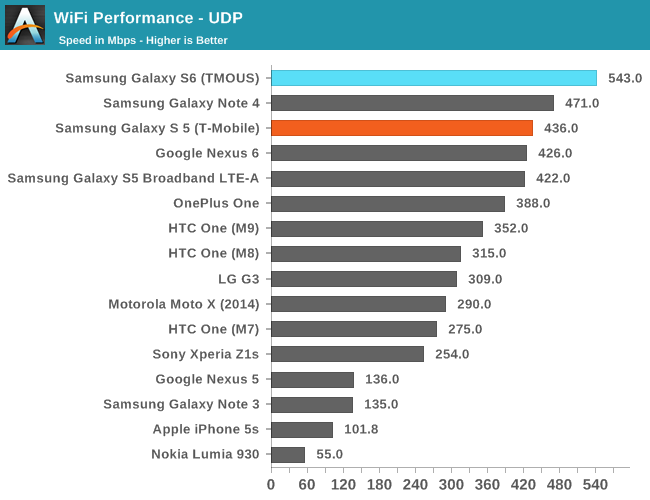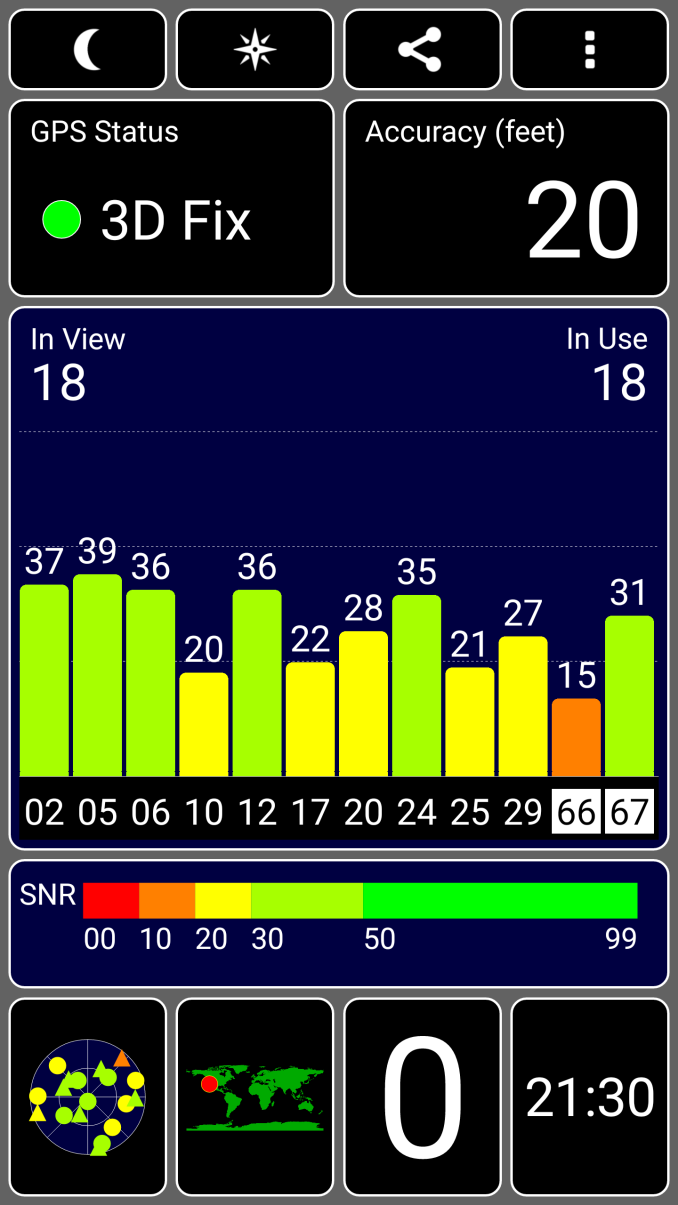The Samsung Galaxy S6 and S6 edge Review
by Joshua Ho on April 17, 2015 9:00 AM EST- Posted in
- Smartphones
- Samsung
- Mobile
- Galaxy S6
- Galaxy S6 Edge
WiFi Performance
As WiFi is still quite important on a smartphone for anyone on a relatively limited data plan, it's also important to test how well a device behaves when using WiFi. In order to do this, we use our standard iperf test to see how fast the device can send UDP packets. In the case of the Galaxy S6, we see that it shares the same BCM4358 WiFi/Bluetooth combo chipset that we first saw in the Galaxy Note 4. As always, in order to ensure maximum possible performance we're using an Asus RT-AC68U router to avoid issues with the router bottlenecking the phone.

As we can see, the Galaxy S6 manages to do better than anything else we've been able to test in recent memory. I'm not sure what's causing the difference in performance when comparing against the Note 4, but it's definitely possible that the antenna configuration has been improved to increase coherence and therefore the performance benefit that comes from MIMO.
GNSS Performance
In most of the Galaxy S6 variants, as there is no Gobi modem that could be used to provide GNSS location services it seems that Samsung has turned to Broadcom to provide satellite location services. In the case of the Galaxy S6, we see a Broadcom BCM4773 location chipset. This includes support for all of the major constellations including GPS, Beidou, and GLONASS in addition to SBAS, which helps to improve accuracy beyond what conventional GPS satellites can provide. To get a good idea for how good this system is I tried testing how long it took for a lock to happen on a clear night with airplane mode on. The Galaxy S6 managed to acquire a lock in 20 seconds which is likely to be a warm lock but a cold lock will likely take a minute without assistance data. After an additional 20 seconds I saw a peak accuracy of 20 feet, so there shouldn't be any notable issues with the GPS system. For the Galaxy S6 CDMA variants it's likely that location will be done using the MDM9x35 Gobi modem rather than the Broadcom solution used in the GSM Galaxy S6.
Misc
For the Galaxy S6, Samsung has fundamentally uprooted how they traditionally design their phones, and in the case of the entire radio architecture this is especially true. Instead of the standard Qualcomm modem, we see that Samsung has moved to the Shannon 333 GSM/LTE modem for the Galaxy S6 GSM variants. Given that this is likely to be the same modem that is in the Note 4 LTE-A it’s likely that this modem will ship as category 6, while we have reason to believe it's ultimately capable of UE category 9. However, whether the RF front-end is capable of handling 3x carrier aggregation of up to 450 Mbps on the downlink is a different question and is likely to be one that we won’t know the answer to unless support is added in an OTA update.
The transceiver, envelope tracker, antenna tuner, and most of the components that would traditionally be Qualcomm parts in a Snapdragon-equipped phone have also been replaced with Samsung Shannon components based upon the Chipworks teardown. In general though, I didn’t notice any issues with this choice of RF components although judging by the use of Qualcomm modems in the CDMA variants it’s likely that such a move was necessary in order to ensure good RF performance on CDMA networks but not GSM networks due to Qualcomm’s experience with CDMA2000. It's likely that anyone that has had previous experience with the CDMA Galaxy Nexus would be able to attest to this.
Unlike some other variants, we’ve noticed that the Galaxy S6 T-Mobile variant uses an Audience eS804 voice processor to enable hot word detection and S-Voice launching and is likely also active in phone calls and in any other scenario where noise cancellation and voice processing would be beneficial. The T-Mobile variant that we received also uses an NXP PN547 NFC module rather than a Samsung NFC module, but we did confirm that there is an ST-M digitizer used for the touchscreen and a Cypress CapSense PSoC for the capacitive keys.
Although I still don’t have the equipment to test speakers properly, subjectively the audio quality of the Galaxy S6’s single downward-firing speaker is good. The volume gets high enough that I never really used it on maximum volume for videos, but it’s still annoying to have to cup my hand to ensure that sound is going towards my face rather than traveling away. Overall the M9 still has much better speakers for a good media experience, but there’s nothing wrong with the speaker on the Galaxy S6 for casual use. I definitely found myself using it less than the front-facing speakers on the M9 though.











306 Comments
View All Comments
Inteli - Friday, April 17, 2015 - link
While no removable battery is workable (if disappointing), I dislike the removal of the SD Card slot in favor of being more iPhone-like, since it allows for more storage (and I don't have to worry about clearing stuff out for updates). Hopefully Samsung won't go this way with the Note 4, or else that might very well be my last Samsung phone.Inteli - Friday, April 17, 2015 - link
And by Note 4, I meant Note 5.Vandam500 - Friday, April 17, 2015 - link
I doubt it man. The Note 5 will likely be very similar to the GS6 which means no removable battery and no microSD card slot.mindracer - Friday, April 17, 2015 - link
I have a feeling Samsung will keep the Note series as it's "productivity/business class", be like the GS6 but with removable storage and battery, and make the GN5 the top of the line in design and features for the real heavy user.Solandri - Friday, April 17, 2015 - link
What I don't get is, Samsung makes like two dozen different smartphones. Why can't they make two top-tier phones - one with the "everything sealed" philosophy and another with the "user can replace the battery and microSD card" philosophy, both using the same screen, processor, camera, etc.?lyricalsaint - Friday, April 17, 2015 - link
Probably because Apple has been so successful with marketing theory, and Samsung wants to copy their concept of giving consumers limited choices. Too many choices can put people into somewhat of a decision paralysis.Gigaplex - Friday, April 17, 2015 - link
But it's too late for that, Samsung already has too many choices.joos2000 - Saturday, April 18, 2015 - link
It isn't hard to cut models to reduce choice really. They can slim down their product line in months.MacDaddy100 - Friday, April 24, 2015 - link
It's not a marketing theory, its not many people give a rats a$$ about removable batteries and upgrade memory cards, I plug my phone in at night like 99% of the people do, I have 128gb of internal memory that hold my 10K (High Bit Rate) song library with room left over that very few people even want to do with Pandora and such that don't need the internal memory. Quit living in the 90s, everything thing is online, or in the cloud now.peterfares - Saturday, April 25, 2015 - link
So then why didn't you just get the 32GB model?